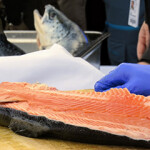GRMI responds to FAO report critical of African fishmeal sector

Members of the Global Roundtable on Marine Ingredients (GRMI) have issued a joint statement in response to the Food and Agriculture Organization (FAO) published on 21 January, 2022, its report “Socio-economic and biological impacts of the fish-based feed industry for sub-Saharan Africa.”
The report found the recent expansion of Chinese and European fishmeal processing operations in West Africa poses a risk to regional food security and provides little socio-economic benefit.
In response, GRMI members called for more-effective regional and national fishery management strategies through the implementation of direct regulatory measures, such as stock assessments and effective vessel monitoring.
The roundtable emphasized the importance of assessments to the fishmeal and fish oil industries, which can be used as tools for local populations in poorer countries to transition beyond subsistence farming and fishing to output of value-added products. A move to more modern production and regulatory methods would in turn help satisfy export markets and provide local sources of food and animal production.
“This will in turn ensure the evolution of sustainable fish supplies for local consumption as well as a sustainable value-added sector for both human consumption and marine ingredients,” they said.
GRMI said that although the report calls attention to the additional challenges created by rapid expansion of the marine ingredients sector in the region, “it overlooks the promising contribution that can be made by incentive mechanisms like fishery improvement projects, such as the ongoing one in Mauritania.”
GRMI also recommend the carrying out of an assessment and monitoring of trends in fish consumption and affordability, and the role sustainable fisheries play in ensuring food security and optimal nutrition levels in sub-Saharan Africa.
“This will enhance understanding of the situation in each country, and help guide solutions and improvements,” they said.
Fishmeal and fish feed are necessary for global food production, but the rapidly improving efficiency of aquafeed means more can be done with less, they said.
“The efficiency of modern aquaculture and feed formulation ensures that every one kilogram of fish used in fish diets results in much more than one kilogram of farmed fish production,” GRMI Independent Chair Árni Mathiesen said.
GRMI is composed of the Global Seafood Alliance, Nestlé, Federation of European Aquaculture Producers, Olvea, MarinTrust, IFFO – The Marine Ingredients Organisation, Sustainable Fisheries Partnership, Biomar, Cargill, Skretting, and the Aquaculture Stewardship Council. The members said in a joint statement that the development of better fish harvesting and post-harvesting methods is the best way to ensure reduced bycatches and losses currently experienced in the countries they studied in sub-Saharan Africa.
“Together with refocusing relevant fisheries on human consumption, this will improve availability and quality of fish for human consumption while increasing the amount and quality of byproducts that can be used for production of marine ingredients,” they said.
Photo courtesy of the FAO






Share